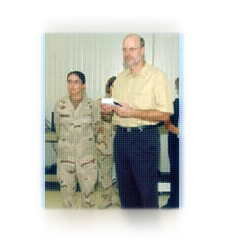|
|
 |
 |
DESTINATION GUANTANAMO BAY, CUBA
The Legitimacy of GTMO: An Eyewitness Report, Page 16
A Travel Journal by Dr. Eric A. Zillmer
Pacifico Professor of Psychology at Drexel University

< PREVIOUS SECTION | NEXT SECTION >
|
 |
 |
Guard Duty
1400

|
 |
The briefing by the Commanding Officer of the Joint Task Force has concluded. No question, he is highly articulate and capable, and believes in his mission.  These are not innocent individuals that have been assembled at GTMO we have been told, they are guilty. Regarding legal counsel there are now hundreds of lawyers that provide counsel to many of the detainees, but it is not clear to me who is provided with outside legal counsel and who is not. During my visit I asked numerous times why there is so much misinformation about GTMO. Unanimously the culprits are thought to be the lawyers who are thought to disseminate false or exaggerated information. These are not innocent individuals that have been assembled at GTMO we have been told, they are guilty. Regarding legal counsel there are now hundreds of lawyers that provide counsel to many of the detainees, but it is not clear to me who is provided with outside legal counsel and who is not. During my visit I asked numerous times why there is so much misinformation about GTMO. Unanimously the culprits are thought to be the lawyers who are thought to disseminate false or exaggerated information.
The briefing also informed me of details about the operational side of GTMO I did not expect. I learned that over 43,000 pieces of mail have been mailed or delivered to detainees over the years. Yes, the materials are translated and censored by the military. Family visits are not allowed. Guard duty is difficult and dangerous at GTMO. Each year detainees engage in over 1,000 verbal threats to guards, typically in the form of threats against the guard’s personal lives and his or her family. As a result, the U.S. troops that watch over the detainees remove their name tags, which are attached by Velcro. Everyone uses a code name or abbreviation in front of detainees. Some replace their nametags with other phrases. For example, the commanding officer of the Joint Detention Group wore a nametag that read “I Don’t Know.” Additionally, there are hundreds of attacks against guards using bodily fluids; some of the detainees have latent tuberculosis and hepatitis, but none are HIV positive. Because of the risk to the guards, the movements of the detainees are limited, most are not allowed to assemble in groups, and guards and medical personnel often wear stab vests and neck protectors when interacting with detainees.
NEXT...
|
|
|